Serving in Nica-time: Day Three
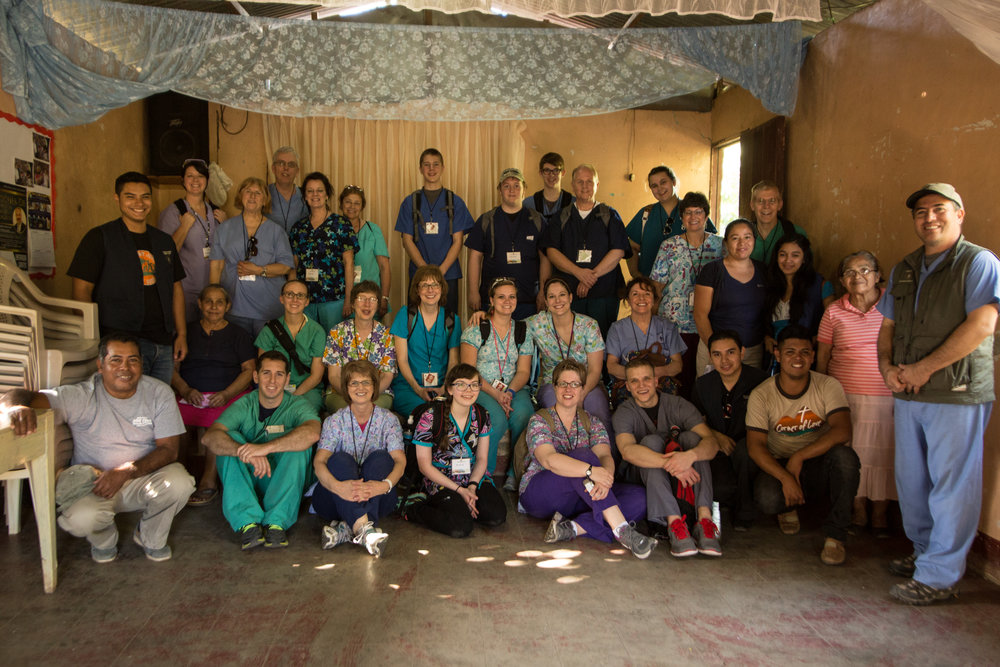 Day Three: March 16, 2015
Day Three: March 16, 2015Lo siento. Lo siento. Lo siento. It's one Spanish phrase I'm pretty good at saying. I say it when I'm squeezing through the narrow aisle of the bus with my camera dangling from my neck, my camera bag jutting from my hip, and my big backpack swinging into everyone's faces. Lo siento if I hit you with my pack. Lo siento if I step on your toe.
Yesterday was our first clinic day, so after a morning of packing the bus and loading our backpacks with the supplies our hosts suggested (flashlight, roll of toilet paper, water bottle, snacks, hand sanitizer), we climbed aboard the bus and lumbered up the bumpy roads. We passed through the main part of town, bustling with locals who were popping in and out of shops. We passed la biblioteca pública and a little shop whose exterior stucco walls were hand-painted with logos--Google, Twitter, Facebook, Instagram. Buildings are bright blue, pink, and orange. Up, up, up the bus climbed until we reached a sharp turn up a steep, gravel road, one side lined with coffee plants, the other with tiny houses built from brick. Some had windows blocked by corrugated steel or thick steel bars. Most had one or two lazy, emaciated dogs lounging in the dirt. Lo siento, little doggies. Lo siento, perros flacos.
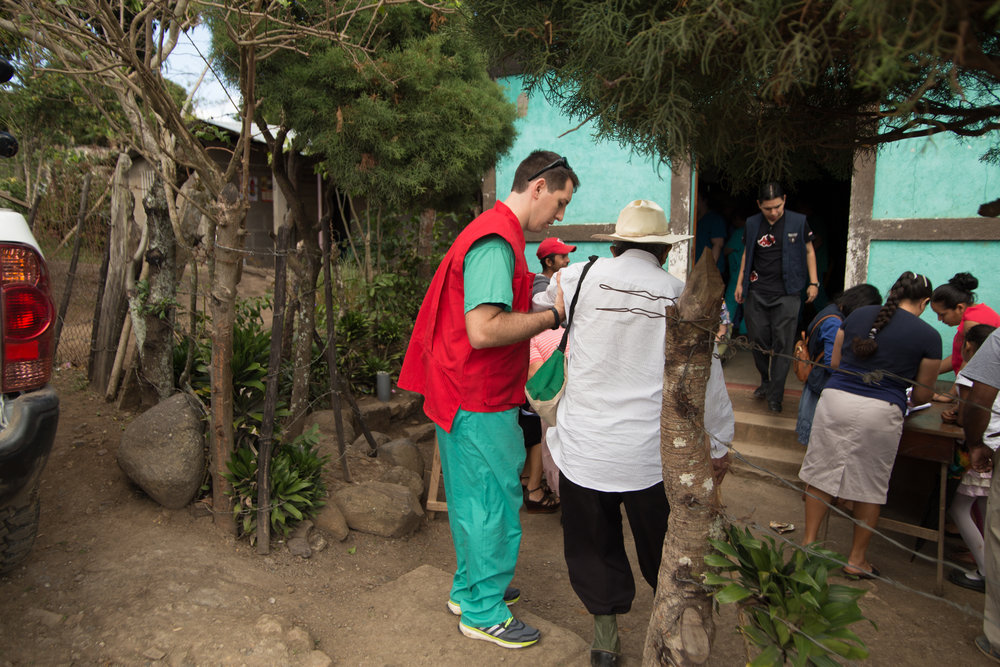
The people were lined outside the door when we arrived. I waited in the back of the bus until those ahead of me were off so I didn't thwack them in the head with my backpack or my camera. Before the trip, Jaynie and I had purchased two new camera lenses to take along. I had agonized a bit over whether to purchase a telephoto or a wide angle. Once I was inside the little Nicaraguan church, I knew the wide angle 17-35mm had been the right choice. There was very little room to move around, so taking in a lot from close up is so helpful. Plus, I must admit, I'm sort of a sucker for those documentary-style wide-angle shots.
One of the first patients was an older blind man in a white hat and white shirt who came hobbling across the road, his cane cautiously feeling the way in front of him. Justin, our team ranchero who keeps things running smoothly, took him by the elbow and guided him into the church. The man told Dr. Andy that he was having trouble sleeping because his whole body would itch. He wasn't eating much, either. Andy told us later that the man had spent much of his life drinking, which I suppose contributed to his blindness, and now he had cirrhosis of the liver. I'm sorry, blind man. Lo siento.

All through the day, Tanya would call out "Próximo!" and then Perry would go to the door and call out "Próximo!" And the next person would be lead to the triage table to tell the worker their name and why they were there. By the end of the day, we would see more than 100 people, treating more than 300 people, including the other people in each person's household. They received treatment for parasites, and joint pain, and headaches, and stomach problems. The farmacia team would dispense hundreds of doses of ibuprofen, vitamins, TUMS, antibiotic, Bag Balm, and hydrocortisone cream.
In the ropa y zapatos room, Jaynie and Lori spent the day distributing the clothing and shoes that had been donated for the mission. They ran out of shoes quickly, and women's clothing soon after that. Women came for clothes, and Jaynie had to tell them, "No mas. Lo siento." Men came for shoes, and Lori had to tell them, "Lo siento. No mas. Lo siento." It's hard to say no to someone who is standing in front of you and trying to decipher your rudimentary Spanish. It's hard to say no to someone who could really use a gently-used pair of shoes. But the airlines only allotted us one 50-pound piece of luggage each, and then we paid for another 50-pound piece, but those were mostly for supplies. An additional bag, Kathy told me, cost $125 to check.
But there were plenty of people who did receive clothing and shoes and hats. The older woman with the green bandana who hugged me for taking her photo really loved the dress she received. There were little boys who received shirts and pants, and little girls who received shoes and dresses. Lori gave away a dress that Chris had helped her granddaughter Katie make as a sewing project. The dress has a new home in a little mountain village near San Ramon, Nicaragua.
For the first part of the day, the ropa y zapatos team had a hard time communicating with the Nicaraguan people. Neither of them spoke Spanish, so they found themselves pointing and shrugging a lot. The translators were working with the doctors and the dentists and the nurses. Lo siento, ropa y zapatos team! Lo siento! Then along came Javier who lived in the village and had spent three years in Belize where he had learned English and spoke it fluently. Javier taught us to say, "hermosa," and "no mas zapatos," and "muy guapo," and "¡qué linda es!" At one point, I took a photo of a young man leaning against the doorway of the room, a beautiful halo of light framing his face. "Muy guape!" I said. Javier laughed. "Guapo," he corrected me. "Guapo." Lo siento, man in the doorway. I asked Javier what I had said, and he said it didn't really mean anything, but I had almost said, "cuate" which means "twins."
"So if I see handsome twins, I can call them cuates guapos?"
"Si," Javier laughed, "you can call them cuates guapos."
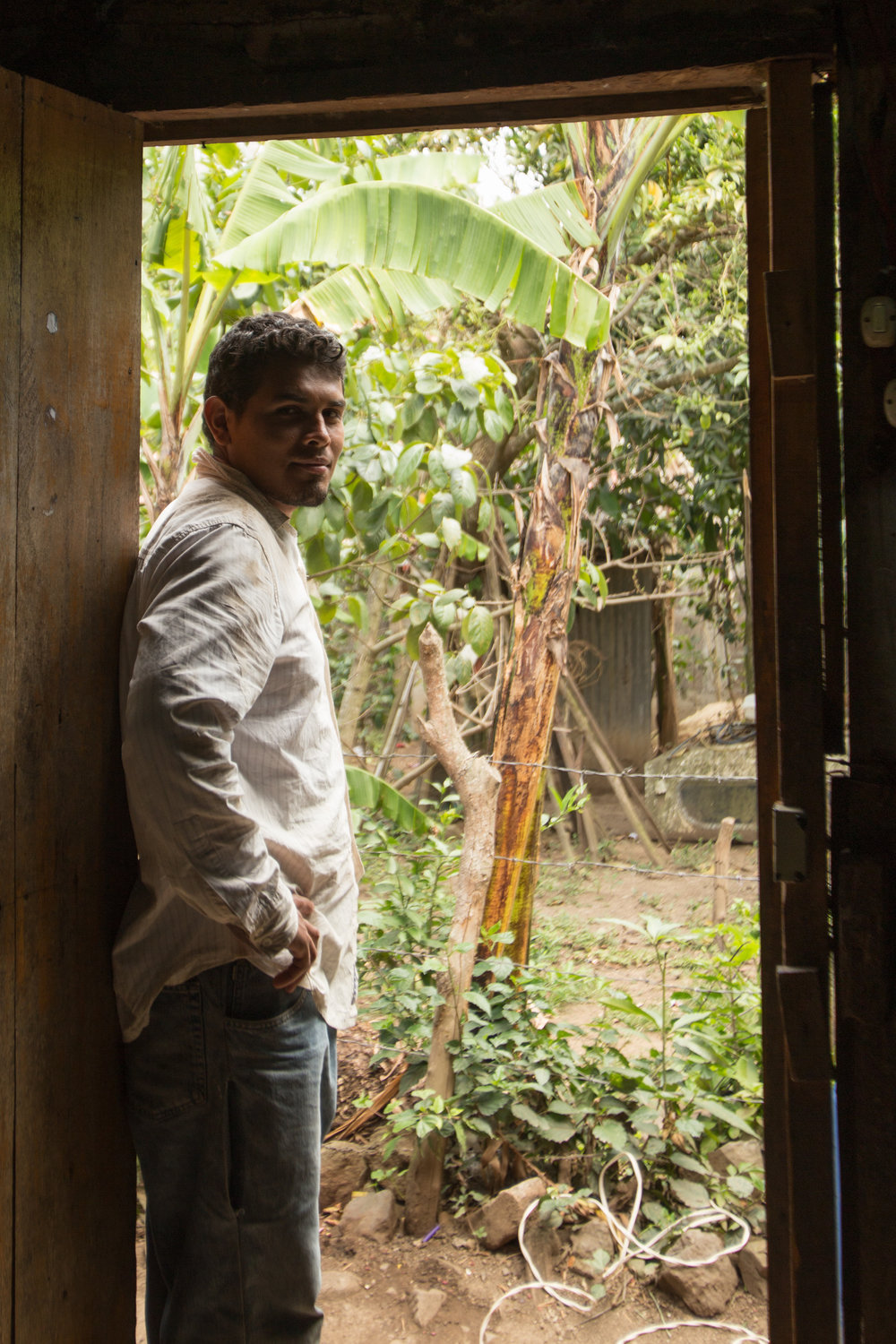
Javier told me that it's very hard to find work. He preaches during the week, and he finds whatever work he can in the village, but he said it's not easy.
While I was in the ropa y zapatos room eating my lunch of enchilada on a crispy tostada, an elderly man hovered around the clothing table, picking up pieces, holding them up, and then putting them back down. Each
patient receives a card during their visit, and some are given the option of choosing clothing while it's determined that others don't have quite as much need. The man had already been through the ropa y zapatos station, but he seemed to feel he had forgotten something. A Cincinnati Reds baseball cap had caught his eye, and he turned it round and round in his hands. The man wasn't going to ask for the hat, so Jaynie offered it to him as part of his allotted ropa. Immediately, he placed it on his head and hugged each of us tightly before posing for a portrait with his new hat.
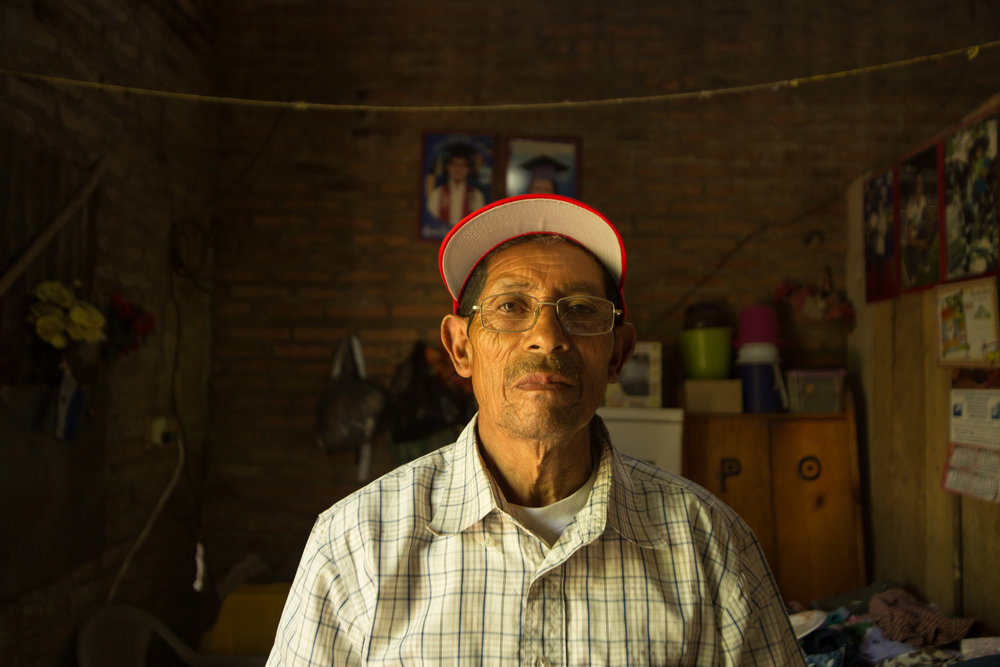
The dental team worked on the raised platform of the church, the feet of Dr. Lindsay's patients jutting out into the alley beside the building. Dr. Lindsay hovered over the patients, touching each of their teeth, asking, "Dolor?" The first man she saw had his lower seven teeth extracted. Watching the team work was amazing. So much compassion. So much patience. Their assistant, David, gladly responded to their beck and call, cleaning instruments and handing out stickers to the children, and doing anything that was asked of him, all with a big smile on his face. At one point, he was so eager to get from one place to another, landing him on the floor. "Are you okay, David?" I asked. Without a moment's hesitation, he popped back onto his feet and called out, "I'm great!"
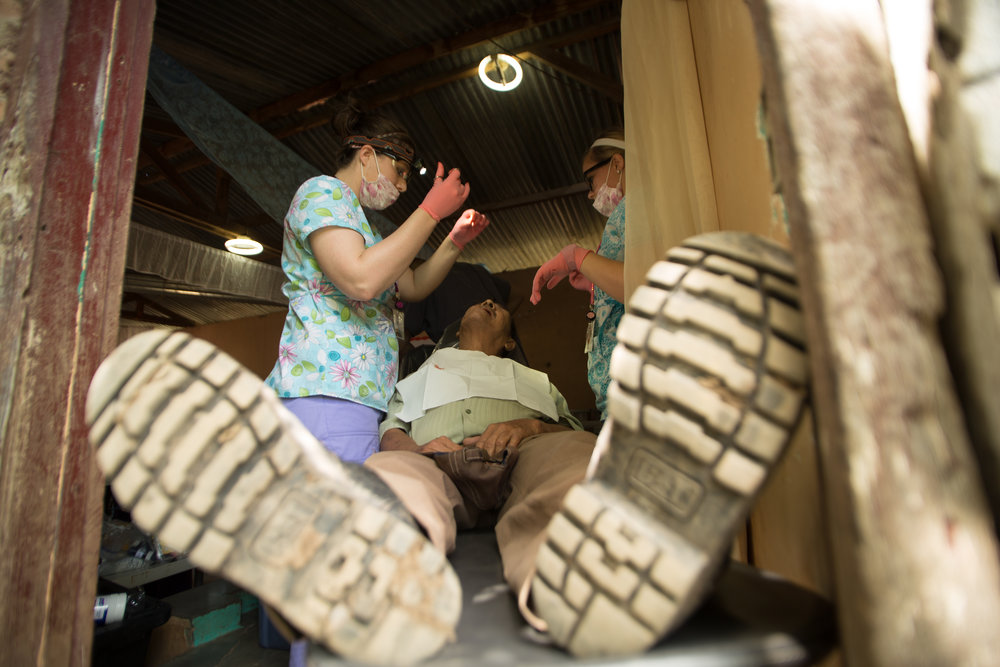
Sometime during the day, I plopped onto the floor next to the height and weight team of Chris and Annie. I sanitized my hands and pulled a bag of roasted, salted almonds from my pack. A little boy stood in front of me, so I asked him his name. "Mi nombre es Memito," he said. I held out the bag of almonds, and Memito shyly took a couple and popped them into his mouth. After he had chewed and swallowed them, I asked him if he liked them. "La gusta?" He nodded, so I held out the bag again. He took a few more almonds than the first time. After he had eaten them, I held out the bag again. As his mother called him away, he stuck his hand in the bag and grabbed as many almonds as he could. I guided his other hand into the bag, and he filled that one, too before running off. A few minutes later, he was back, and I offered him the bag again. This time, I noticed he had a small pocket on the front of his pants, so I held it open, and he caught onto the idea quickly, filling the pocket with almonds. The next time he came back, there were only a few almonds left in the zip-top bag, so I gave it to him. Immediately, he tried to share his new acquisition with me. A lot of the mothers struggle to provide enough protein for their children. I wished I could pack a whole suitcase full of almonds and fill all the pockets of all the children there.
At the end of the day, Nelson, the codirector of Corner of Love, presented the hosting church with the proceeds from the day. Each patient must purchase a ticket for a very small sum in order to be seen, and those funds are given to the organization that opens their doors to the Corner of Love clinic. After the presentation, Javier prayed. I could understand about zero of what he was saying during that prayer, but, let me tell you what--that man prayed with such passion and fervor that tears were streaming down my cheeks by the time he said, "Amen."
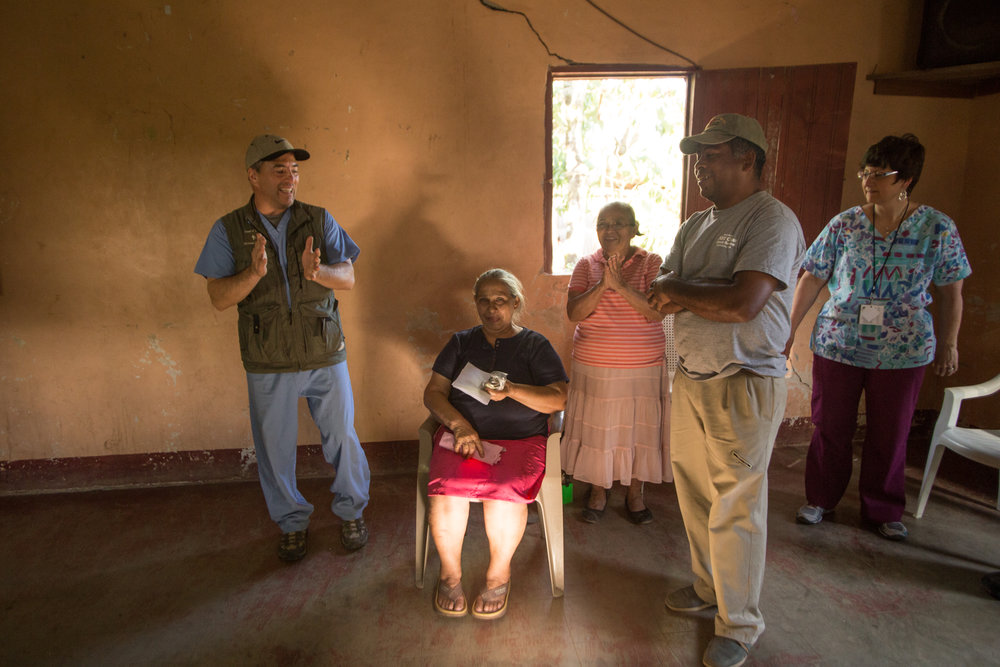
And almost as soon as it had begun, the day was over, the supplies were packed back onto the truck and the bus, and everyone was saying, "Adios," and "gracias" to everyone else. Javier gave me and the ropa girls big hugs, saying he would miss us so much. We agreed that we would miss him, too.
Okay, I'll admit this one thing. I have trouble sometimes owning my feelings. I often think I *shouldn't* feel a certain way. That if I'm sad about something, it's because of my faulty way of thinking, and I shouldn't feel sad. If I feel proud of something, I think it's wrong of me to feel proud. I think about this post even now, and I think, "Should I really feel that way?"
But here's the truth about today. I said "lo siento" a lot. Or at least I thought it. I felt sorry that I didn't have more almonds, or more ropa, or more zapatos. I felt sorry that I couldn't understand the woman with the green bandana when she held my hand and spoke to me in Spanish. I felt sorry that I said, "hermana" instead of "hermosa" when I was trying to tell the young girl how pretty she was. I felt sorry that I couldn't say, "Desculpa, por favor" properly when I was trying to squeeze through the crowd. I felt sorry that I couldn't feed the skinny dogs or translate for the dentists or take the perfect picture or hand out medicine or hold someone's hand and say, "It's okay. It will be all right." I will own those feelings, whether they are naive or silly or misguided. What I felt was sorry, and that's all I can own--my feelings. Sorry that I couldn't do more, say more, know more. I am trying to be glad for what the team is able to do, which is a LOT. They are the doctors and the dentists and the nurses. They are doing miracles. They are the rock stars. But I do feel inadequate. I'll surely do the best with what I have, though, because I know there are miracles here, even if I can't see them all. That's nothing to be sorry for.
Much love now and more later from San Ramon, Nicaragua.
